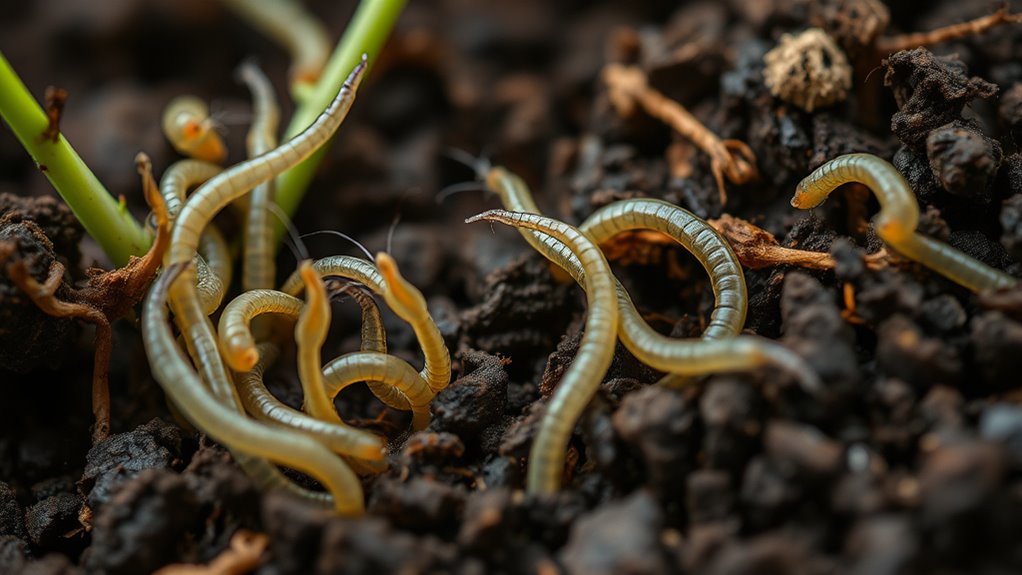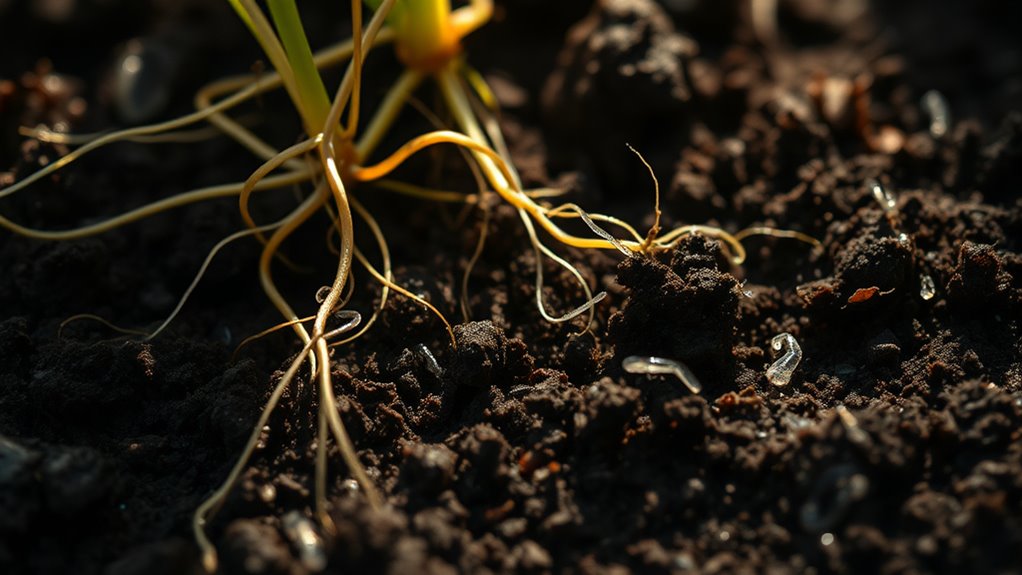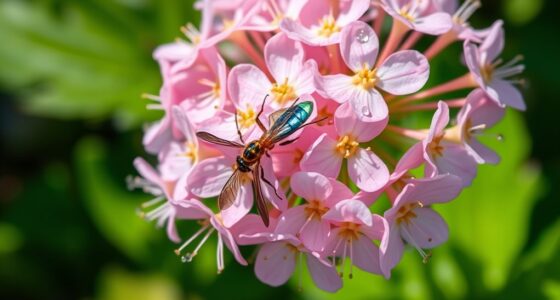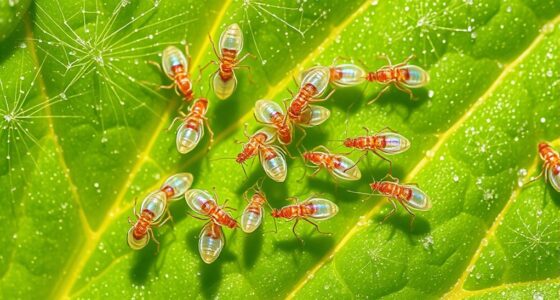Meet your garden’s bodyguards: beneficial nematodes are tiny creatures that hunt soil-dwelling pests like beetle larvae and grubs. You can easily apply them by mixing with water and watering into the soil. They work underground, entering pests’ bodies and releasing bacteria that kill quickly. Plus, they don’t harm plants, pets, or helpful insects. Keep going, and you’ll discover how these natural predators promote healthier, more resilient gardens.
Key Takeaways
- Beneficial nematodes are natural predators that target underground pests like beetle larvae and grubs.
- They are applied by mixing with water and watering into the soil for effective pest control.
- These microscopic worms selectively attack pests without harming plants, pets, or beneficial insects.
- They reproduce in the soil, providing ongoing pest management and reducing chemical pesticide reliance.
- Using beneficial nematodes promotes healthier soil, enhances plant growth, and supports a sustainable garden ecosystem.

Have you ever considered natural ways to control garden pests? If you’re looking for effective pest control strategies that don’t involve harsh chemicals, beneficial nematodes might be just what you need. These tiny, soil-dwelling creatures are natural predators of many common garden pests, including beetles, grubs, and larvae. When applied correctly, they can considerably reduce pest populations while promoting a healthier garden ecosystem. Since they work underground, beneficial nematodes target pests at their source, preventing damage before it even starts. This approach not only keeps your plants safe but also aligns with sustainable gardening practices.
Using beneficial nematodes offers multiple pest control strategies that are both eco-friendly and efficient. You simply mix them with water and apply the solution to your soil, making it easy to target pests lurking beneath the surface. These nematodes seek out pests in the soil, enter their bodies, and release bacteria that kill them quickly. Because they act naturally, they don’t harm plants, pets, or beneficial insects like bees and butterflies. This specificity makes them a smart choice for gardeners who want to maintain a balanced and healthy garden environment. Plus, since they reproduce in the soil, their population naturally increases, providing ongoing pest control without additional effort.
Aside from pest control, beneficial nematodes contribute to soil health benefits that many gardeners overlook. They help aerate the soil as they move through it, improving its structure and allowing roots to grow more freely. By reducing pest populations, they also decrease the need for chemical pesticides, which can degrade soil quality over time. Their presence encourages a more diverse and resilient soil ecosystem, supporting beneficial microorganisms that enhance nutrient uptake and overall plant health. This holistic approach to pest management not only keeps your garden thriving but also sustains long-term soil fertility. When you incorporate beneficial nematodes into your garden routine, you’re investing in the vitality of your soil—an essential foundation for healthy plants.
Frequently Asked Questions
Are Beneficial Nematodes Safe for Pets and Children?
You might wonder if beneficial nematodes are safe for pets and children. Rest assured, they’re generally considered safe because they target specific soil pests and don’t harm humans or animals. For pet safety and child protection, follow application instructions carefully, avoid direct contact during treatment, and wash hands afterward. When used properly, beneficial nematodes offer an eco-friendly pest control option that’s safe for your loved ones and your garden.
How Long Does It Take to See Results After Application?
Imagine you’re in the year 3024, wondering when you’ll see results after applying beneficial nematodes. Usually, you’ll notice visible signs of pest control within 24 to 48 hours, but it can take up to a week depending on application timing and pest activity. Consistent application guarantees better results, so patience is key. Keep an eye on your garden’s health, and you’ll soon see those pesky pests retreating.
Can Beneficial Nematodes Be Used With Chemical Pesticides?
You can use beneficial nematodes with chemical pesticides, but chemical compatibility is essential. To avoid harming the nematodes, it’s best to adjust your application timing—apply nematodes first, then wait a few days before using pesticides. Always check the label for specific instructions, as some chemicals may be more harmful. Proper application timing ensures your nematodes stay effective and your plants stay protected.
What Are the Best Environmental Conditions for Nematode Effectiveness?
You should guarantee ideal environmental conditions to maximize nematode effectiveness. Keep soil moisture consistently moist, as dry soil hampers their movement and survival. The ideal temperature range is between 55°F and 85°F, which supports their activity and reproduction. Avoid extreme weather conditions like heavy rain or drought, and plant during seasons with stable temperatures. These conditions help beneficial nematodes target pests efficiently and thrive in your garden.
How Often Should Beneficial Nematodes Be Reapplied?
You should reapply beneficial nematodes every few weeks to maintain control over pests, especially during peak activity periods. The application frequency depends on pest pressure and environmental conditions. For best results, consider seasonal timing; reapply in spring and summer when pests are most active. Regular applications ensure nematodes stay effective, keeping your garden protected. Always follow manufacturer instructions for ideal application intervals and reapplication schedules.
Conclusion
Think of beneficial nematodes as silent sentinels, weaving an invisible web of protection beneath your garden’s surface. These tiny warriors patrol tirelessly, hunting down pests like a vigilant guardian in the shadows. With each microscopic strike, they turn your garden into a fortress of health and vigor. Embrace these natural defenders, and watch your garden flourish like a lush, thriving oasis—where harmony reigns and pests are banished by nature’s own guardians.









